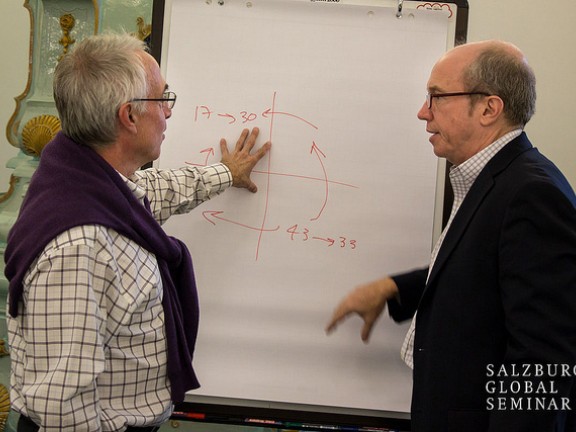The Volcker Alliance: A Year of Action

It was just over a year ago that our Board Chairman, Paul A. Volcker, launched the Volcker Alliance to address the crucial challenge of improving the execution of public policies and to rebuild trust in government. Needless to say, this is an enormous undertaking, so it should not be surprising that it has been a very busy year. We have set priorities, launched several projects, and begun building a team. I am happy to report great progress and am excited to share with you highlights of our three-pronged strategy: tackling a few systemic problems each year where Volcker Alliance involvement is likely to make a difference, building capacity in our three priority program areas, and strengthening change-driving networks.
Several inaugural projects are off to a strong start.
The Truth in State Finances project aims to root out gimmickry in state budgeting and financial reporting, building on the State Budget Crisis Task Force co-chaired by Paul Volcker and Alliance board member Richard Ravitch. The project, a core part of our state, local, and intergovernmental program area, is now underway. We are analyzing financial practices in New Jersey, Virginia and California to identify indicators of unsound budgeting and financial reporting that can be used to assess practices in all fifty states. With this project, we hope to make it harder to kick the can down the road by imposing current costs on future generations and underinvesting in future returns.
Our financial regulatory reform project is also making significant headway. Chairman Volcker, Director Michael Bradfield, and Project Manager Gaurav Vasisht are reaching out to leading practitioners and academics to identify gaps and overlaps in the federal regulatory apparatus threatening future financial stability to inform recommendations for future reform.
A third project aims to increase the number of top-quality young people entering federal public service. It targets a very specific problem that is proving a barrier to entry for those seeking federal jobs: misunderstanding of regulations for the Pathways Programs governing federal agencies’ use of interns and ability to hire recent graduates. Attracting more strong students to government employment is of little value if they cannot get hired. Along with the Partnership for Public Service and the Robertson Foundation for Government, the Alliance has initiated this project to debunk myths surrounding internship and recent graduate regulations and support several federal agencies who want to build strong internship and recent graduate programs.
As part of the Alliance’s Performance, Impact, and Innovation capacity-building work, we partnered on a “Moneyball for Government” event with Results for America and the Brookings Institution. We co-hosted roundtable discussions of two newly released “Investing in What Works” papers, one on education and one on Head Start. Both papers take the crucial and long overdue step of urging program evaluators to ask not just what works but, equally important, what works better. The studies reflect increasing recognition that when evaluators ask only the “thumbs-up/thumbs-down” question whether a program works, it triggers unconstructive debates in defense of or opposition to a program’s existence. Evaluations that reveal the path to improvement are far more valuable and constructive. Both studies also underscore the importance of paying attention to end-users’ needs for data and evaluation results.
In the year ahead, we will have many more exciting developments to share with you and, I hope, engage you. In a recent speech, Paul, with characteristic humility, remarked that the only important word in “Volcker Alliance” is “Alliance.” While I respectfully disagree that “Alliance” is the only important word, we hope you will join us in our efforts and thank you for your interest and support.
